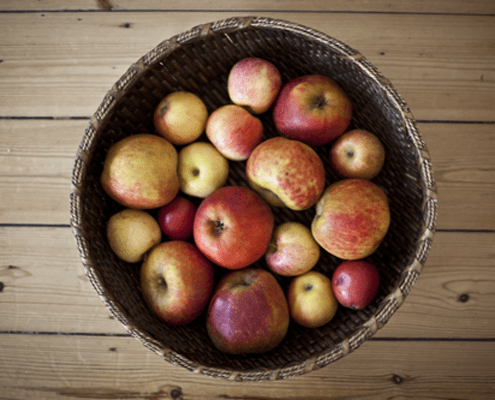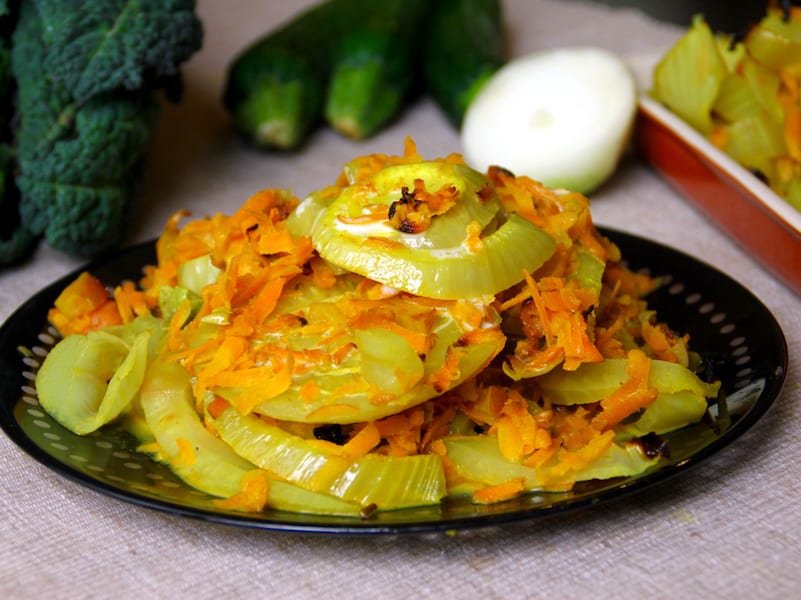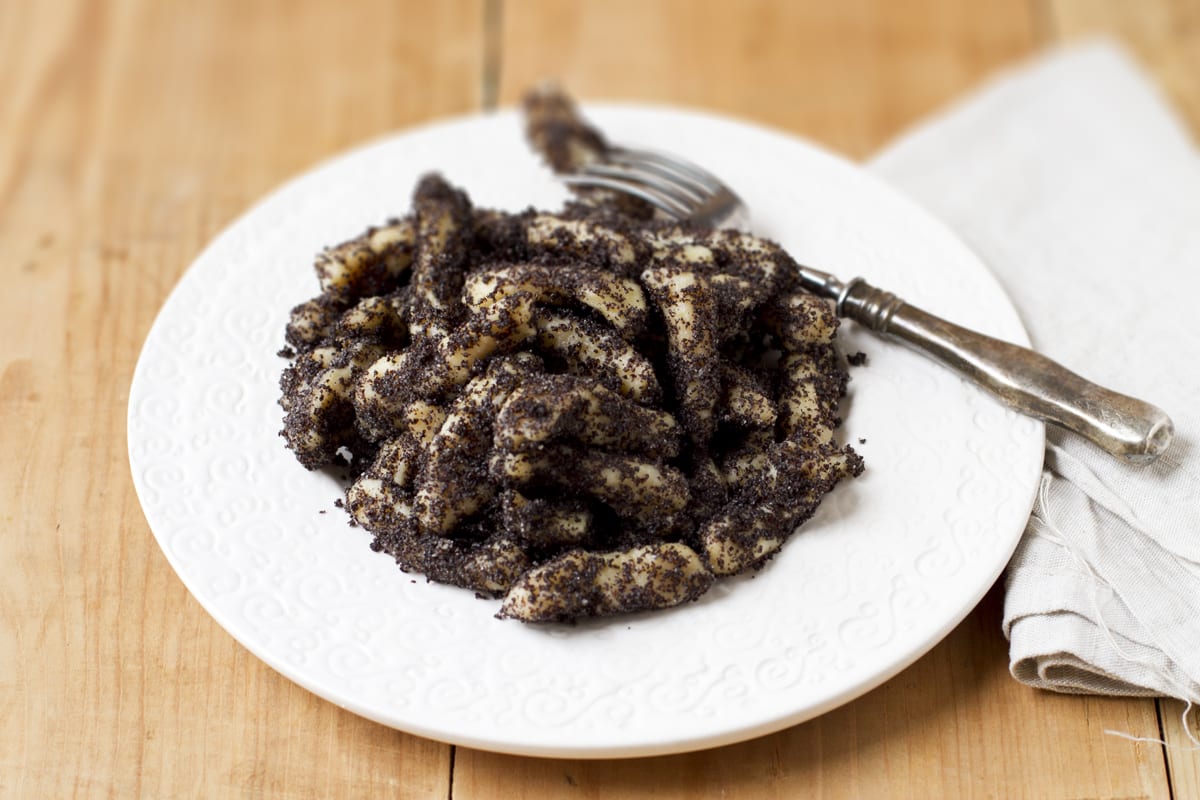As a Dane with an international outlook, Rikke's recipes covers…
If you can implement all, or just some, of these 10 tips into your food routines, you can eat the best produce out there, for the same budget as you do now!
By Rikke Oestergaard
When it is argued that there is no proof that eating organic is better for you than eating ‘normal’ produce, I beg to differ. Eating organic is really not a new invention. If you go back 70 years, everything was by default organic – therefore no long term insight into the effects of eating non-organic produce exists. However, I think for most people… it’s simply common sense.
Many (myself included) struggle in their mission to eat organic, as they perceive it to be too expensive. And it’s true…organic produce is often more expensive, as it can be more labour extensive and as super markets simply see an opportunity to make money. However – it is not expensive compared to what food and fresh produce used to cost. During the last 50 years, we have simply changed our food production drastically, to be able to produce cheap and accesible food for everyone. We, the consumers, have become spoiled, greedy and lost contact with how we are really supposed to eat and we expect cheap, fast food. I therefore suggest that we can all eat organic, healthy and natural food, if we change our habits! Not to a new and limited way of thinking, shopping and eating, but to how we used to do it.
If you can implement all, or just some, of these 10 tips into your food routines, I promise you that you can eat the best produce out there, for the same budget as you do now!
1. Plan your meals
Living busy lives and with supermarkets on every corner, many people have gotten used to shopping every day after work. This leads to easy, expensive choices in the form of processed food, small packets of meat and veg and a lot of waste. Planning your meals should not be considered a chore or an over-organised task undertaken only by housewives – it’s a must in every home! Plan your dinners and lunches weekly, or every 3 days and shop accordingly. This way you can plan to use leftover produce from one evenings meal in the next, and should in practice end up with a empty fridge every week. This should also spare you for the awkward ‘when did I buy this, and is it still fresh’ question.
2. Buy in bulk
We all know that produce (and any other product for that matter) is cheaper if bought in bulk. Of course this is difficult with fresh vegetables and fruits, but for store cupboard ingredients and meat, you can easily do it. Buy 2 kilos of minced beef, and bag it up in smaller portions yourself. Buy the big bags of rice, several cans of tomato on offer etc. This does not only ensure that you get the cheapest deals, but also that you always have a full store cupboard and freezer to depend on.
3. Rethink your shopping channels
For many of us, supermarkets are the most convenient place to do our shopping. But it is absolutely not where we get the best, freshest or even cheapest produce. Opposite my appartment is an advertisement for a shop that sells speakers – it says: ‘You don’t get good sound where you buy your fridge’, refering to the big stores selling any kind of household appliance or electric good. The same thing applies to your food. You do not get the best meat where you buy your washing powder, or the best vegetables where you buy your soda. Hell, you don’t even get the best coffee, where you buy your cheese. I am not arguing that you should visit 10 different speciality shops to get your groceries, but I do urge you to reconsider if there could be better alternatives to your supermarket chain – especially when it comes to vegetables. Many countries have organic vegetable box offers, food hubs, coop farms, farmers markets etc, where you can buy your produce directly from the source. Doing this will ensure you the freshest produce, at the cheapest price and with the most profit for the farmers producing it.
4. Cook from scratch
Junk food is still junk food, even though it’s organic. A pre-made pasta sauce, a musli bar or potato chips are still packed full of sugar and fat, and they are still massively overpriced even though they are organic. Therefore, cook from scratch as much as your time and ability allows you to. I’d argue that any dinner, lunch and baked good should and can easily be made entirely from scratch. If you can start experimenting with your own snacks, such as musli bars and nut mixes, you are pretty much set for success. Don’t get tempted to buy the easy option in the supermarket! Prepare your dinners using easy recipes and don’t give up because you have a couple of failures. Whatever some people might say, home cooking is not a science; if you put together ingredients that you think tastes good, that are fresh and that you have handled with love and care, who cares that the dish doesn’t have a real name or would ever be served in a restaurant.
5. Don’t waste
If you look at the statistics for food waste, it is horrifying how much produce gets thrown out, because we think they have gone out of date or because they don’t look as picture perfect as when we bought them. Learn to ‘listen’ to your produce, not the dates written on them. These dates are guides, mostly for the shops to follow regulations! If the milk smells fine, it is fine. If the meat is still fresh looking and smells fresh, it is fresh. If your apple is a bit bruised, cut of the brown bit and use it in a apple sauce. If you have a sad excuse of a carrot left in the bag, grate it up and chuck it in your bolognese – it won’t kill you, I promise. The same approach applies to the leftovers after dinner. Don’t throw them out, but plan your meals so you have ways to bulk out a bolognese so it lasts another day, to use it in a packed lunch or freeze it down for a day a lesser trained cook in your household is home alone. Point is, respect the animal that died for you to eat it and the farmer that worked hard to produce good vegetables!
6. Eat seasonal
Eating seasonal often goes hand in hand with eating locally, at least from your own country. You will really struggle finding an organic fruit or vegetable out of season as they will have to have come from another country, and probably wouldn’t survive the journey not pumped up on pesticides. If you do, it will be extremely expensive. So eating seasonal also helps you support your local community and farmers. Don’t get hung up in months, but look at the seasons and use your common sense. Did that strawberry really grow out of the snow in december? Are apples really ripe in June etc? This will help your wallet and your health, as it helps you eat a varied and natural diet.
7. Eat less meat
I know – this might be a deal breaker. But, even when I think back to my childhood, that really isn’t that long ago, eating meat was a bit of a luxury. At least the good cuts. Eating chicken breasts every day, and steak every week was unheard of. Furthermore, more and more studies show that we do not need all the meat we consume, and that meat production is more harmful to the planet than cars. And – buying organic meat is expensive. So, if you can cut down your meat intake to say 3-4 times away or maybe from all your lunch meals, you are not only doing favours for your wallet, but also the environment and your health. If you want to ensure the animal has lived a healthy life, buy free range – organic does not necessarily mean that.
8. Cook for several days at a time
Cooking for several days at a time allows you to have days completely free of cooking duties, and thus allows you the time to spend more time on the few meals you do have to cook. Soups, stews and bolognese are great for this. Make huge batches, freeze it down in portions and you will have delicious food ready at any time. Cooking this way also mean you will often get more out of your ingredients. Say you cook 2 chicken breasts, one for you and one for your partner. If you simply grill them you’re likely to eat a whole breast each. However, if you chop it up and put it in thai curry with lots of vegetables, you will probably be able to make those same chicken breasts last for 2 days. Thus, only eating 1/2 chicken breast per day per person!
9. Eat nose to tail
Don’t worry. I don’t mean it that literal. Supermarkets are full of minced beef and chicken breasts, but try and explore new cuts of meat. If you listen to advice no. 3 and start shopping differently, you will also get access to some great ‘alternative’ cuts. Shoulder, neck, ribs and brisket are absolutely delicious pieces of meat, and very cheap. They need slower cooking, but if you start planning your meals better, this does not have to be a problem. Also explore animals you might not normally have eaten; horse (I know, I know – but don’t knock it till you try it), turkey and specific types of fish are a lot of cheaper than the well ‘accepted’ animals, and just as nice.
10. Be flexible
This might be challenging if you are not a star in a kitchen, but start learning to trust your intuition. If a recipe calls for red cabbage but you already have white, then use that. Learn to replace your ingredients with similar ones that are cheaper, you have access to or even already have in the fridge. It’s not as difficult as you think – just think about what they taste like. Red and white onions are easily interchangeable broccoli and cauliflower, apple cider vinegar and white wine vinegar. No – your finished result might not be as picture perfect as the one in the cookbook, but if you don’t tell anyone they won’t know, and you might just surprise yourself with some of your own creations!
As a Dane with an international outlook, Rikke's recipes covers every cuisine in the world, but with a classic, warming and clean Scandinavian twist. She cooks seasonal, organic and economical food, blogs at 02acres.com and believes she might have been born 50 years too late.




